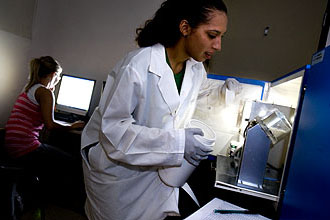Learning What Makes Brains Tick
In laboratories on the uptown and downtown campuses, Tulane undergraduates are learning the value of basic research, sharpening their presentation skills and gaining insight into the big career picture through the neuroscience summer research program.

In an uptown campus lab, senior Maria Perez conducts research on a model to study the differences in males and females with ADD and ADHD, as part of the neuroscience summer research program at Tulane. (Photo by Paula Burch-Celentano)
Neuroscience senior Maria Perez is testing a particular strain of rats to see if it would be a viable model to study the differences in males and females with attention deficit disorder and ADD with hyperactivity.
Working under the guidance of Jill Daniel, associate professor of psychology, Perez is identifying patterns of impulsivity and hyperactivity symptoms more prevalent in males and inattentiveness, which is seen more often in females with the disorder.
“This is like my little baby,” says Perez, who has been involved with the project from the beginning. She plans to see it through to the end and hopes to contribute to publication of the research.
Students in other labs are working alongside faculty and doctoral students on a variety of research projects, studying how hormones present early in life may cause differences in male and female approaches to learning and memory, and determining how thyroid hormone variations affect behaviors that denote anxiety and learning.
Gary Dohanich, professor of psychology, started the neuroscience summer research program three years ago with a view toward getting students more involved in research and teaching them to “appreciate research for what it is.” Serving as co-director of the nine-week program is Beth Wee, associate dean for undergraduate studies in the School of Science and Engineering.
The participants present their research at weekly group meetings, helping them to sharpen their presentation skills and gain a better understanding of the overall theme of their projects, as well as exposing them to other areas of neuroscience research, Dohanich says.
Belinda Lacoste is a student studying journalism in the School of Continuing Studies and a staff member who writes for the School of Science and Engineering.
